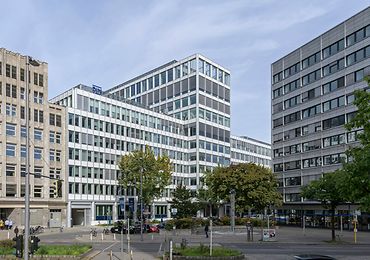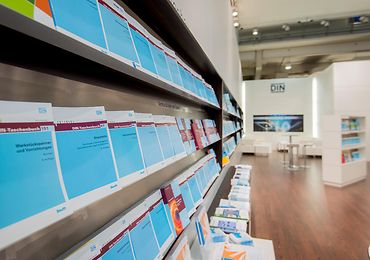DIN Standards
What is a DIN Standard?

DIN Standards are the results of work at national, European and/or international level. Anyone can submit a proposal for a new standard. Once accepted, the standards project is carried out according to set rules of procedure by the relevant DIN Standards Committee, the relevant Technical Committee of the European standards organization CEN (CENELEC for electrotechnical standards) or the relevant committee at the international standards organization ISO (IEC for electrotechnical projects).
All stakeholders can participate in this work, including manufacturers, consumers, businesses, research institutes, public authorities and testing bodies. They send experts to represent their interests within DIN's working bodies, which are overseen by some 70 standards committees, each of which is responsible for a specific subject area. For work at European and international level, the DIN standards committees send experts to represent German interests within CEN and ISO, respectively. DIN staff members coordinate the standardization process and are responsible for overall project management, ensuring the uniformity and consistency of the German standards collection.
Standards are developed with full consensus, that is, they are developed by experts with the aim of arriving at a common standpoint, taking the state of the art into consideration.
DIN Standards are reviewed at least every five years. If a standard no longer reflects the current state of technology, it is either revised or withdrawn.
National standardization begins with a proposal for standards work that anyone can submit to DIN.
Once a proposal has been received, the responsible DIN committee discusses with the relevant experts the need for a standard on that subject, if they are willing to finance the project, and whether the work is to be carried out at national, European or international level. If the proposal is accepted, this is publicly announced in the "DIN-Anzeiger für technische Regeln" (DIN Gazette for Technical Rules) and on the websites of the respective standards committees.
If a decision has been made to develop a national standard, and the responsible steering body has approved this, then a draft standard is developed, which is published by DIN Media. Draft national standards are also made available for free on DIN's draft standards portal for commenting.
All comments received are discussed by experts in the standards committee, who come to consensus on the content of the standard. The finished standard is then published and sold by DIN Media.
European Standards are developed by CEN, CENELEC (for electrotechnical standards) or ETSI (for standards in telecommunications). Work at CEN and CENELEC is based on the national delegation principle: Each country (DIN, in Germany) sends a delegation of experts to represent the national standpoint in the European committees. This standpoint is developed in national committees that "mirror" the European committees. This way, stakeholders can work together in their own native language - a definite advantage. By taking on the secretariat of a European committee, national members (such as DIN) can play a leading role in the committee's work. It is often decisive for national interests to be effectively represented at an early stage of the development of a European Standard.
Proposal stage
European standardization work begins with a proposal for a standard, which might come from a member of the European standards organizations CEN/CENELEC/ETSI (such as DIN), the European Commission, or another European or international organization. At least a simple majority and 71 percent of the weighted majority among all national standards bodies voting are needed for the proposal to be accepted. In addition, a sufficient number of national standards bodies must agree to participate, after having checked with their stakeholders that there is sufficient need - and sufficient financing - for carrying out the necessary work in the national mirror committees. Only then will the proposal be accepted and work on the standard can begin.
If there is an existing International Standard on the subject, it will be adopted, unchanged, as the European Standard. If this is not the case, the responsible working body will draw up a manuscript for the draft standard (prEN).
Draft standard
The draft standard is distributed to the national standards organizations for commenting in what is called the "public enquiry" stage. National comments are to be submitted within three months. In Germany, a German-language draft DIN EN Standard is published on which anyone may comment within a two-month period (these draft standards can be viewed and commented on DIN's German-language draft standards portal). The national mirror committee discusses all comments received and submits the consolidated national standpoint.
Final draft (optional) and publication
On the basis of the comments received, the responsible working group can either decide to publish the standard or to draw up and issue a final draft. In a formal vote over a two month period, the members then decide whether to accept this final draft as a European Standard. There is no public enquiry for the final draft. Approval of the final draft requires at least 71 percent of the weighted votes of CEN members.
Adoption as a national standard
Ratification of a European Standard takes place following positive voting. After ratification, the European Standard must be adopted, unchanged, as a national standard, and any conflicting national standards withdrawn. Every approved European Standard is published in Germany as a DIN EN Standard with a National Foreword.
In addition, a standard that has been developed at international level can be simultaneously adopted as a European Standard by means of parallel voting procedures in accordance with the Vienna Agreement. Such standards are also to be automatically adopted by the national standards organizations.
International Standards are developed by ISO (or IEC, for electrotechnical standards) according to the national delegation principle, with each country sending a delegation of experts to represent the national standpoint. In Germany's case, DIN sends the delegation. This standpoint is developed in national committees that "mirror" the international committees. This way, stakeholders can work together in their own native language - a definite advantage. By taking on the secretariat of an international committee, national members (such as DIN) can play a leading role in the committee's work. It is often decisive for national interests to be effectively represented at an early stage of the development of a European Standard. The mirror committees also decide whether or not an International Standard should be adopted as a national standard - this is voluntary, in contrast to the European Standards, which must be adopted nationally.
Proposal stage
As at national level, international standards work begins with a "new work item proposal". Such proposals can be submitted by a member of the International Organization for Standardization (ISO), such as DIN, or - in electrotechnical standardization - by a member of the International Electrotechnical Commission (IEC), such as the DKE,
- a working body of ISO or IEC,
- an international organization that has liaison status,
- the Technical Management Board of ISO or IEC,
- the ISO or IEC Secretary General.
A simple majority of national standards organizations with an interest in the subject matter is required for the proposal to be approved. In addition, a sufficient number of these must also agree to participate in the work. Only then will the proposal be accepted and work on the standard can begin. Within two months a "committee draft" is circulated among the members of the responsible Technical Committee for voting. A draft is drawn up taking any comments received into consideration.
Draft standard
The draft standard is then made available to all ISO (or IEC) members, who have three months to submit their national position and comments. In Germany, the responsible working body can decide to publish a German-language draft of a DIN ISO Standard or DIN IEC Standard. Within a two-month period, anyone may comment on this draft (for example via DIN's German-language draft standards online portal). The national mirror committee discusses all comments received and submits the consolidated national viewpoint to ISO.
Final draft (optional) and publication
If the criteria for approval are fulfilled during the voting procedure, the draft is then published as an International Standard. If they are not fulfilled, or if the responsible working group so decides, a Final Draft is published. The ISO or IEC members then have two months to decide whether to accept this as an International Standard. No comments are submitted during this voting period. Acceptance of the Final Draft requires a two-thirds majority of all active members participating, and not more than a quarter of all votes may be negative. Ratification of an International Standard takes place following positive voting. There is no obligation on the part of ISO or IEC members to adopt International Standards as national standards.
In addition, a standard that has been developed at European level can be simultaneously adopted as an International Standard by means of parallel voting procedures in accordance with the Vienna Agreement. Such standards are to be automatically adopted by the national standards organizations.






